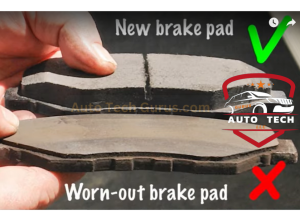After installing new brake pads and rotors, it can be frustrating to encounter squeaking, especially when you expect smooth and quiet braking.
This issue often arises due to various factors related to how the components are installed and the materials used. When freshly installed, brake pads and rotors require a bedding-in period to adapt to each other’s surfaces.
During this phase, minor squeaking may occur as the components wear into a seamless fit.
The type and quality of brake pads are crucial factors influencing noise levels; some materials, especially those found in high-performance pads, may inherently generate more noise.
Moreover, inadequate installation practices, such as failing to clean debris or ensuring proper placement of shims, can also contribute to squeaking.
By addressing these aspects through meticulous installation techniques and selecting appropriate brake components, you can effectively minimize or eliminate brake squeaking over time.
Why do my brakes squeak after new pads and rotors?
Common Causes and Solutions
Bedding-in Process:
When you get new brake pads and rotors installed on your car, they need some time to work together smoothly. This process is called “bedding-in.” It’s like breaking in new shoes — you need to get them comfortable to wear.
During bedding-in, you gently apply the brakes to let the pads and rotors rub against each other. This helps them fit together better and perform well when you need to stop your car. Sometimes, you might hear a little squeaking as they settle in, but that’s normal.
This process usually takes a short time, like a few miles of driving carefully. It’s important because it helps your brakes last longer and work safely. After bedding-in, your brakes should feel smooth and quiet when you use them.
Pad Material:
When it comes to brake pads, the material they’re made of can affect how much noise they make. Some brake pads, especially ones designed for high performance, may naturally squeak more than others. This squeaking can happen because of the materials used in the pads and how they interact with the brake rotors.

High-performance brake pads are often made to handle more heat and friction, which can sometimes lead to squeaking. They might be made of materials that grip the rotor really well for strong braking power, but this can also cause noise.
On the other hand, regular brake pads made for everyday driving are usually designed to minimize noise. They might use different materials that make them quieter when you press on the brakes.
If you notice your brakes squeaking and it bothers you, you might want to check what kind of brake pads you have. Sometimes, switching to a different type of pad can reduce the noise.
Rotor Quality:
The quality of your brake rotors can affect how quietly your brakes work. Low-quality rotors might not be smooth or balanced properly, which can cause vibrations and noise when you brake. It’s important to make sure you’re using good-quality rotors that are designed for your specific car. Also, how they’re installed is crucial. If rotors aren’t put on correctly, they can wobble or rub unevenly against the brake pads, creating noise. Proper installation means they fit perfectly and rotate smoothly with the wheels. When choosing rotors, look for ones that are well-reviewed and recommended for your vehicle to reduce the chances of noise issues.
Caliper Issues:
Your brake calipers are important because they hold the brake pads and squeeze them against the rotors to stop your car. If the caliper slides aren’t lubricated properly or if the caliper pistons get stuck, it can cause uneven pressure on the brake pads.
This uneven pressure can lead to vibrations and noise when you brake. Ensuring the calipers are well-maintained with proper lubrication helps them move smoothly and apply pressure evenly.
Mechanics often check and clean calipers during brake pad replacements to prevent these issues. If you hear noise from your brakes and suspect caliper problems, it’s a good idea to have a professional inspect and possibly service them to restore smooth, quiet braking.



